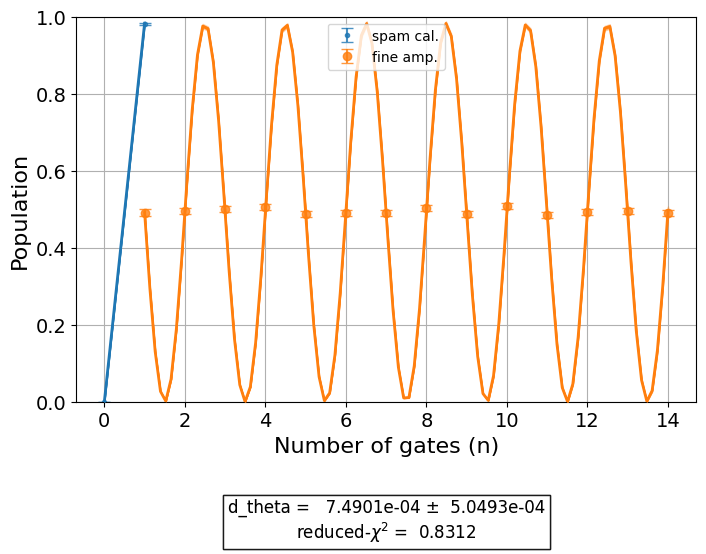Note
This is the documentation for the current state of the development branch of Qiskit Experiments. The documentation or APIs here can change prior to being released.
FineXAmplitude¶
- class FineXAmplitude(physical_qubits, backend=None)[source]¶
A fine amplitude experiment with all the options set for the \(\pi\)-rotation.
Overview
FineXAmplitudeis a subclass ofFineAmplitudeand is used to set the appropriate values for the default options.Analysis class reference
Experiment options
These options can be set by the
set_experiment_options()method.- Options
Defined in the class
FineXAmplitude:gate (Gate)
Default value: Instance ofXGateGate to characterize. Defaults to an XGate.
Defined in the class
FineAmplitude:repetitions (List[int])
Default value: [1,2,3,4,5, …]A list of the number of times that the gate is repeated.normalization (bool)
Default value:TrueIf set to True the DataProcessor will normalized the measured signal to the interval [0, 1]. Defaults to True.add_cal_circuits (bool)
Default value:TrueIf set to True then two circuits to calibrate 0 and 1 points will be added. These circuits are often needed to properly calibrate the amplitude of the ping-pong oscillation that encodes the errors. This helps account for state preparation and measurement errors.
Defined in the class
BaseExperiment:max_circuits (Optional[int])
Default value:NoneThe maximum number of circuits per job when running an experiment on a backend.
Example
from qiskit_experiments.library import FineXAmplitude exp = FineXAmplitude(physical_qubits=(0,), backend=backend) exp_data = exp.run().block_for_results() display(exp_data.figure(0)) exp_data.analysis_results(dataframe=True)

name experiment components value quality backend run_time chisq fcd344e8 d_theta FineXAmplitude [Q0] 0.0503+/-0.0010 good aer_simulator None 0.515331 See also
Initialization
Initialize the experiment.
Attributes
- analysis¶
Return the analysis instance for the experiment
- backend¶
Return the backend for the experiment
- experiment_options¶
Return the options for the experiment.
- experiment_type¶
Return experiment type.
- num_qubits¶
Return the number of qubits for the experiment.
- physical_qubits¶
Return the device qubits for the experiment.
Methods
- circuits()¶
Create the circuits for the fine amplitude calibration experiment.
- Returns:
A list of circuits with a variable number of gates.
- Return type:
list[QuantumCircuit]
- config()¶
Return the config dataclass for this experiment
- Return type:
- copy()¶
Return a copy of the experiment
- Return type:
- classmethod from_config(config)¶
Initialize an experiment from experiment config
- Return type:
- job_info(backend=None)¶
Get information about job distribution for the experiment on a specific backend.
- Parameters:
backend (Backend) – Optional, the backend for which to get job distribution information. If not specified, the experiment must already have a set backend.
- Returns:
A dictionary containing information about job distribution.
”Total number of circuits in the experiment”: Total number of circuits in the experiment.
”Maximum number of circuits per job”: Maximum number of circuits in one job based on backend and experiment settings.
”Total number of jobs”: Number of jobs needed to run this experiment on the currently set backend.
- Return type:
dict
- Raises:
QiskitError – if backend is not specified.
- run(backend=None, sampler=None, analysis='default', timeout=None, backend_run=None, **run_options)¶
Run an experiment and perform analysis.
- Parameters:
backend (Backend | None) – Optional, the backend to run on. Will override existing backend settings.
sampler (BaseSamplerV2 | None) – Optional, the sampler to run the experiment on. If None then a sampler will be invoked from previously set backend
analysis (BaseAnalysis | None) – Optional, a custom analysis instance to use for performing analysis. If None analysis will not be run. If
"default"the experimentsanalysis()instance will be used if it contains one.timeout (float | None) – Time to wait for experiment jobs to finish running before cancelling.
backend_run (bool | None) – Use backend run (temp option for testing)
run_options – backend runtime options used for circuit execution.
- Returns:
The experiment data object.
- Raises:
QiskitError – If experiment is run with an incompatible existing ExperimentData container.
- Return type:
- set_experiment_options(**fields)¶
Set the experiment options.
- Parameters:
fields – The fields to update the options
- Raises:
AttributeError – If the field passed in is not a supported options
- set_run_options(**fields)¶
Set options values for the experiment
run()method.- Parameters:
fields – The fields to update the options
See also
The Setting options for your experiment guide for code example.
- set_transpile_options(**fields)¶
Set the transpiler options for
run()method.- Parameters:
fields – The fields to update the options
- Raises:
QiskitError – If initial_layout is one of the fields.
See also
The Setting options for your experiment guide for code example.